Resisting Mass Deportation Under Donald Trump
Here in Chicago, we’ve developed effective, grassroots strategies for defending our immigrant communities.
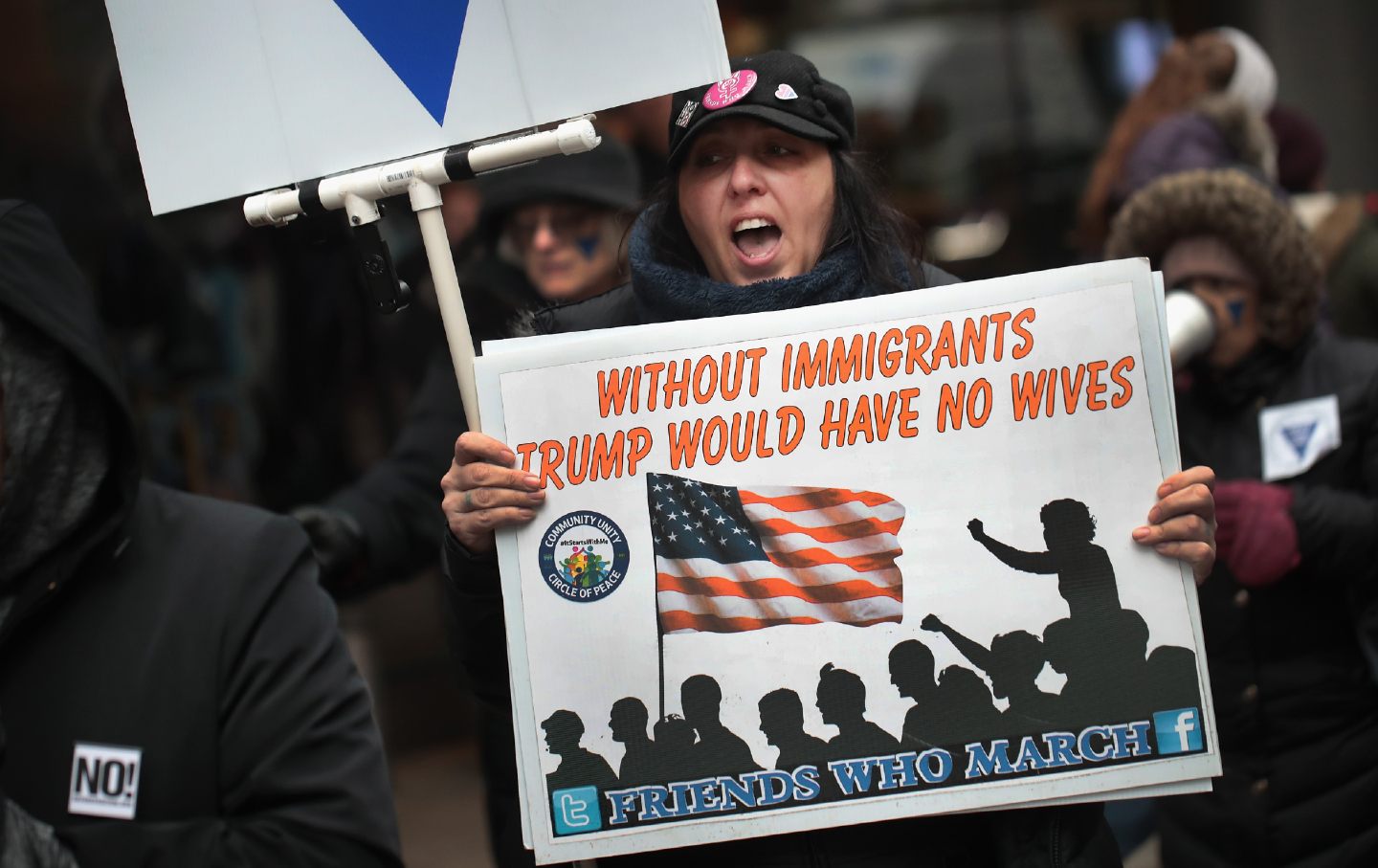
Chicago, Ilinois—In the lead-up to this election, Donald Trump promised the “largest deportation program in American history to get the criminals out.” Although immigrants statistically have some of the lowest rates of criminal activity, for Trump and his associates, all people who have entered the country without proper documentation are criminals. When Trump says he wants to deport criminals, he means every undocumented immigrant in our communities: workers, homeowners, small-business owners, parents, spouses, and children.
Such a massive deportation regime would be devastating for our American communities—large and small—resulting in the separation of families, the closure of businesses, and the hollowing out of entire neighborhoods.
During Trump’s first term in office, he ordered Immigration and Customs Enforcement (ICE) raids in major cities, including cities and counties like our own, which have sanctuary policies. His xenophobic statements and actions caused immense harm to our immigrant communities. Now, as he returns to office on the promise of an even more extensive deportation dragnet, local governments and communities must take bold action to challenge the systems that criminalize our neighbors.
At the core of this resistance is grassroots organizing. We must be prepared to take direct action at the local level to challenge a federal deportation regime. This means continuing and expanding what many communities across the United States did in 2017: enacting comprehensive and robust sanctuary-city policies, organizing neighbors to engage in direct action to protect their immigrant neighbors, and building networks of mutual aid and solidarity.
Community-based grassroots organizing has been one of the most potent tools for resisting mass deportation. In 2017, communities across the nation, including our own in Chicago, organized deportation defense networks. On Chicago’s Northwest Side, we organized the Community Defense Committee out of the 35th Ward office. We trained hundreds of neighbors on how to identify ICE in our communities and how to engage in nonviolent civil disobedience; we knocked on thousands of doors to inform neighbors of their fundamental constitutional rights and what to do if ICE came to their door, workplace, or neighborhood. In 2025, we must continue this grassroots organizing work, and elected officials who represent immigrant communities must make Know Your Rights education and deportation defense work part of the core constituent service offered by their district offices.
To disrupt Trump’s deportation regime, local and state governments must adopt robust local noncooperation policies with ICE. It is not enough to declare our cities, states, and public institutions as sanctuaries—we must ensure that local and state laws protect undocumented communities from ICE by prohibiting information sharing and collaboration with ICE, including by third-party contractors.
In Chicago, our grassroots organizing to defend our neighbors led to one of the most robust big-city sanctuary-city policies in the nation. The Chicago Police Department is legally barred from working with ICE in any case, with no exceptions. During Trump’s second term, it will be critical to defend such policies already on the books, to expand the number of cities and states that have these policies on their books, and to close loopholes that undermine these policies. For example, while Chicagoland’s Cook County has prohibited public official cooperation with ICE, ICE still targets the county’s undocumented residents through data purchased from third-party data brokers who do business with the county. That’s why the two of us are working to pass No Data for ICE legislation through the County Board of Commissioners.
Like during his last term, Trump is likely to use the threat of withholding federal funding as a cudgel to compel cities and states to abandon their sanctuary policies. Local and state elected officials, and our communities, must prepare to resist this pressure, including explaining and defending the importance of sanctuary policies.
While grassroots organizing for direct action and passing noncooperation policies are crucial to challenging Trump’s deportation regime, mutual aid is an equally important part of the strategy. Mutual aid networks are community-led efforts to meet the needs of undocumented migrants and their families, covering everything from providing food and shelter to offering legal assistance. By providing tangible support, mutual aid not only helps people survive; it also builds solidarity and strengthens community ties. Mutual aid doesn’t just alleviate the immediate suffering caused by deportation policies—it fosters long-term, interdependent relationships within communities, making it harder for the government to target individuals when they have widespread, organized support.
Despite all our efforts, Trump will still succeed in deporting many people from our communities, which is why our mutual aid work must become transnational, helping undocumented immigrants reestablish their lives post-deportation. For example, mutual aid organizers supporting deported individuals should work to ensure that former employers issue the final paychecks owed to their now-deported employee.
Trump is promising more aggressive deportation tactics during his second term. We should believe him, and to throw a wrench in his plans, we must build a broad-based movement that unites neighbors and ties deportation resistance to the larger struggles for racial justice and economic equality. It’s crucial that we stand together, in solidarity, to resist these oppressive policies.
Deportation in the United States is not just an immigration issue; it is a tool of racial and economic control. Resisting deportation is not just about stopping raids or disrupting ICE operations; it is about challenging the deeply entrenched systems of racialized violence and exclusion that define US immigration policy.
The fight against mass deportation is a fight for the dignity and humanity of every immigrant and working person in the United States. In response to Trump’s reelection, the need for bold, grassroots resistance is ever more urgent. Through grassroots organizing, direct action, noncooperation with ICE, and mutual aid, communities can defend immigrants from deportation and begin to dismantle the systems that perpetuate racialized violence. Ultimately, our work to defend our communities from deportation must assert the right of all people to live freely, with dignity and safety, regardless of their immigration status.
Popular
“swipe left below to view more authors”Swipe →By creating networks of care and solidarity, immigrant communities are less reliant on a system that seeks to expel them. These networks become incubators for resistance, where people don’t just survive—they organize.
Support independent journalism that exposes oligarchs and profiteers
Donald Trump’s cruel and chaotic second term is just getting started. In his first month back in office, Trump and his lackey Elon Musk (or is it the other way around?) have proven that nothing is safe from sacrifice at the altar of unchecked power and riches.
Only robust independent journalism can cut through the noise and offer clear-eyed reporting and analysis based on principle and conscience. That’s what The Nation has done for 160 years and that’s what we’re doing now.
Our independent journalism doesn’t allow injustice to go unnoticed or unchallenged—nor will we abandon hope for a better world. Our writers, editors, and fact-checkers are working relentlessly to keep you informed and empowered when so much of the media fails to do so out of credulity, fear, or fealty.
The Nation has seen unprecedented times before. We draw strength and guidance from our history of principled progressive journalism in times of crisis, and we are committed to continuing this legacy today.
We’re aiming to raise $25,000 during our Spring Fundraising Campaign to ensure that we have the resources to expose the oligarchs and profiteers attempting to loot our republic. Stand for bold independent journalism and donate to support The Nation today.
Onward,
Katrina vanden Heuvel
Editorial Director and Publisher, The Nation
More from The Nation
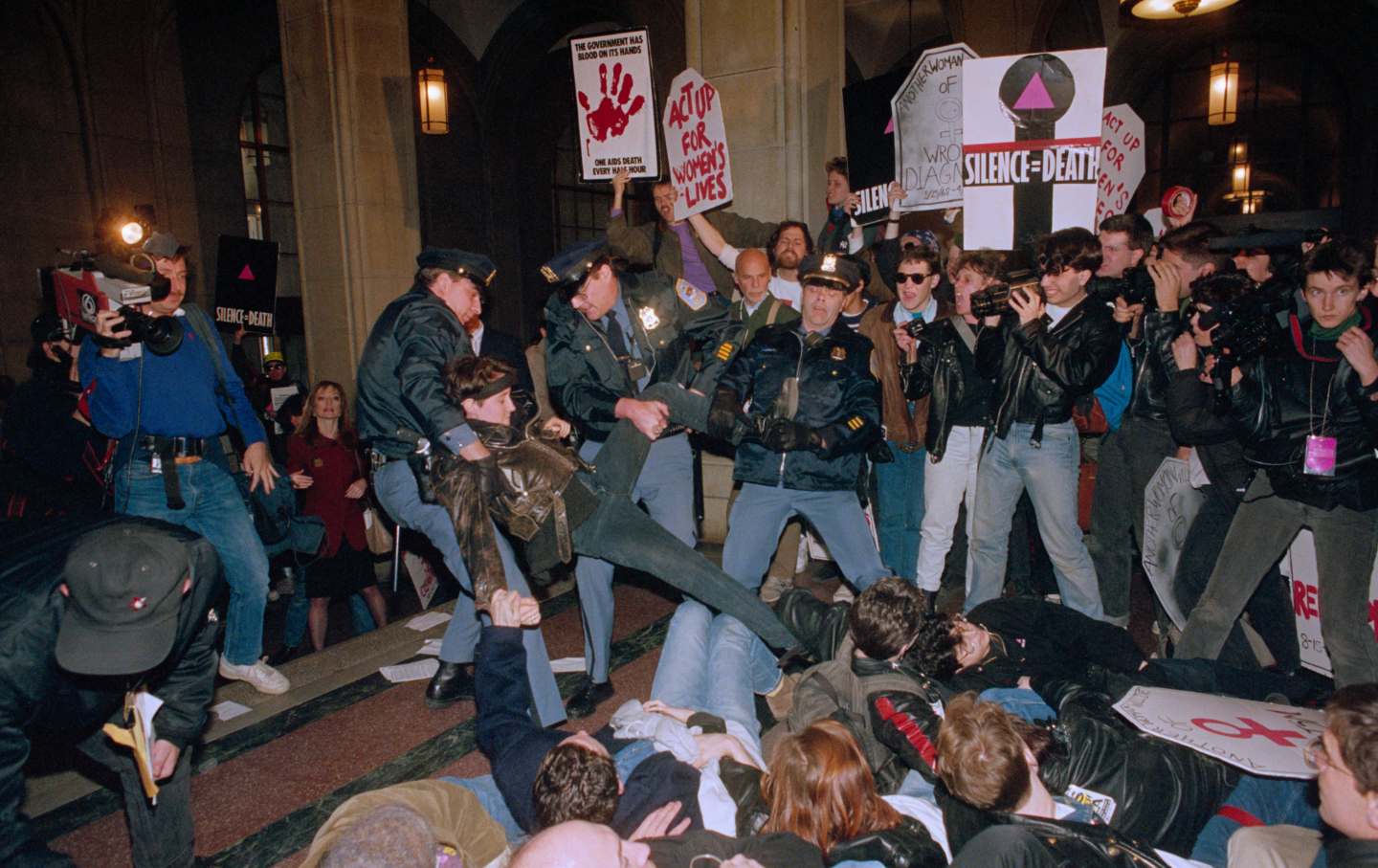
We Need to Turn Our Outrage Way Up We Need to Turn Our Outrage Way Up
This is no time to sit idly by. People’s lives are at stake. We have to put our bodies on the line.
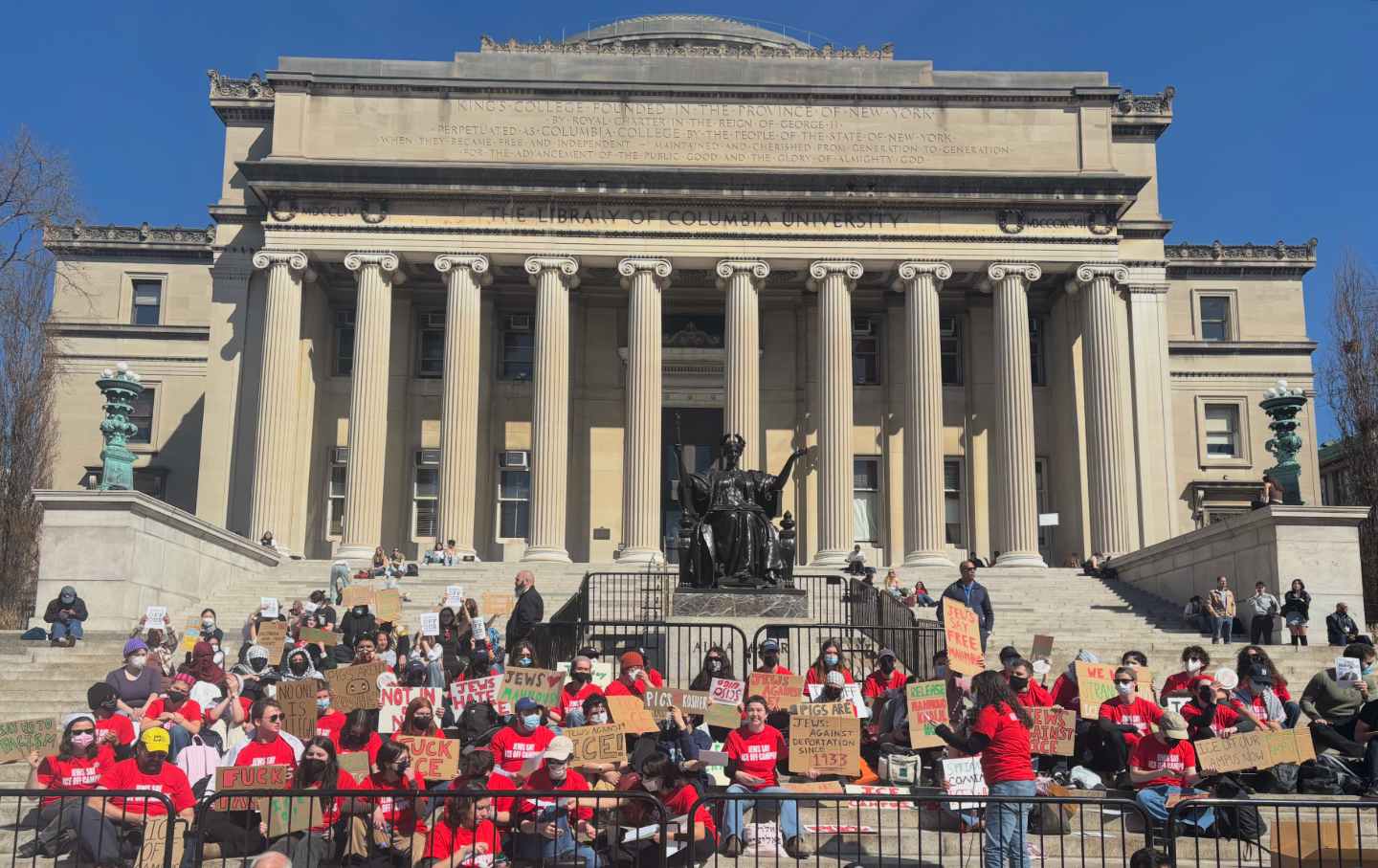
Mahmoud Khalil’s Detainment Won’t Stop the Pro-Palestine Student Movement Mahmoud Khalil’s Detainment Won’t Stop the Pro-Palestine Student Movement
The reverberations of Khalil’s arrest are being felt beyond Columbia University’s campus.
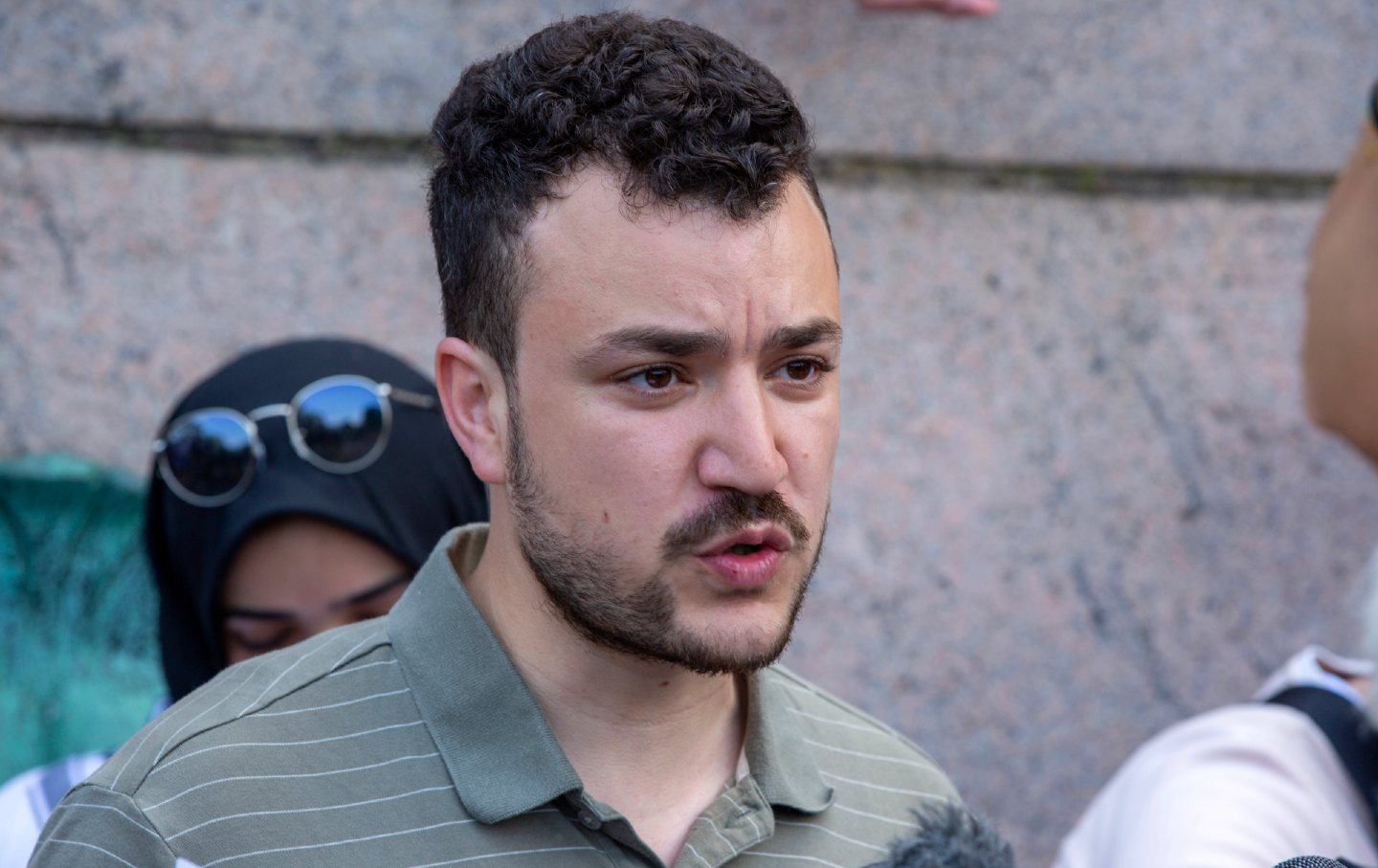
Mahmoud Khalil Is the First Activist to Be Disappeared by Trump Mahmoud Khalil Is the First Activist to Be Disappeared by Trump
The detention and attempted deportation of Khalil is a test by Trump to see how far he can go—and a test for us to see how hard we will fight back.
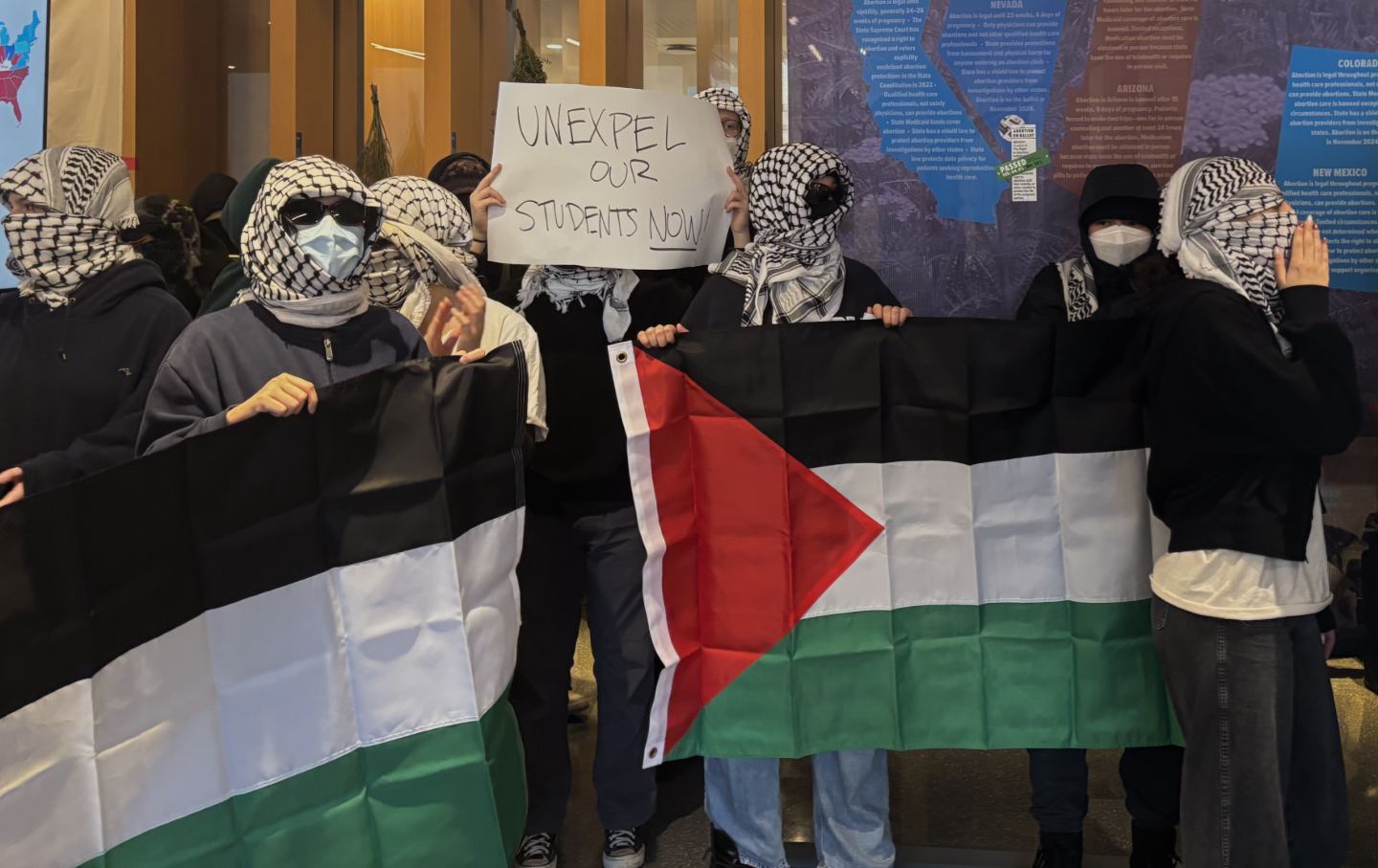
Columbia Expelled Student Protesters For the First Time in Over 50 Years. But Activists Won’t Back Down. Columbia Expelled Student Protesters For the First Time in Over 50 Years. But Activists Won’t Back Down.
On March 5, protesters were arrested after dozens formed a sit-in at Milstein Library to demand the reinstatement of three expelled students.

CUNY Faculty Are Still Determined to Hire Palestinian Studies Scholars CUNY Faculty Are Still Determined to Hire Palestinian Studies Scholars
Faculty at Hunter College submitted a revised job listing after Governor Hochul told the school to remove one that used the terms “settler colonialism,” “genocide,” and “apartheid...

Backlash or Blacklist? Hollywood’s Pro-Gaza Protesters Feel the Heat Backlash or Blacklist? Hollywood’s Pro-Gaza Protesters Feel the Heat
In whisper campaigns and puzzling career reversals, pro-Palestinian actors say that they're being punished for speaking out.


